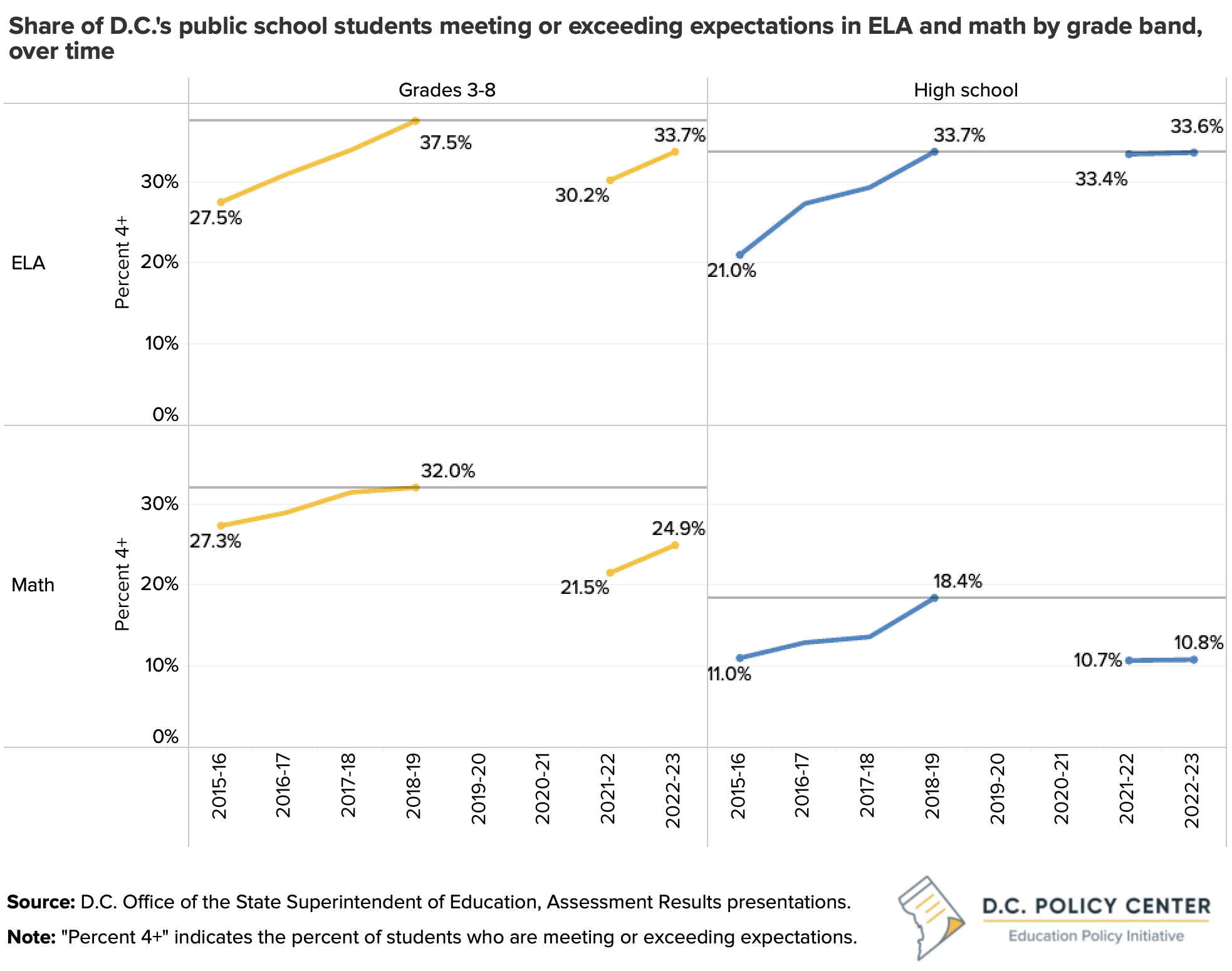D.C. has just released statewide assessment results for school year 2022-23. The statewide assessments were put on hold for the first two years of the pandemic, meaning that last year was the first time that we were able to observe the impact of the pandemic on learning outcomes. This year, the statewide assessments provide information on academic recovery, which was a key focus for the District during school year 2022-23.
The results show that recovery, in terms of learning, is off to a good start. Overall, both English Language Arts (ELA) and math proficiency have improved since school year 2021-22. ELA saw a 2.9 percentage point gain (33.7 percent of students meeting or exceeding expectations), and math saw a gain of 2.6 percentage points (21.8 percent of students meeting or exceeding expectations). All racial and ethnic groups saw an increase in math outcomes, while most groups did so in ELA.1 In addition, students in special populations—including students who are designated as at-risk, students with disabilities, and English learners—experienced gains.2
However, digging deeper into these improvements, there are large differences in assessment results by grade band. There has been a stronger recovery for elementary and middle school students than for high school students. Learning outcomes for elementary and middle school students (grades 3 to 8) improved by 3.5 percentage points in ELA, an annual rate consistent to pre-pandemic years. In math, learning outcomes for this same group increased by 3.4 percentage points, which is higher than annual increases pre-pandemic.
Even with a relatively strong recovery for elementary and middle school students, it will take years to return to where D.C. could have been without the impact of the pandemic. If D.C. had continued to improve at the same rate as the four years before the pandemic, 38 percent of students would now have met or exceeded expectations in math. Instead, at the current rate of improvement, that’s now projected to occur five years later in school year 2026-27. Similarly, in ELA, if learning outcomes had continued to improve at pre-pandemic rates, a potential 51 percent of students would now have met or exceeded expectations—which is now expected seven years later in school year 2028-29.
Results for high school students, on the other hand, remained flat in both subjects during this recovery period after a pandemic decline. For context, most of these high school students were in middle school when the pandemic began. For ELA, proficiency for high school students is comparable to school year 2018-19, with 33.6 percent of students meeting or exceeding expectations. But there has been little change from last year. For math, proficiency for high school students dipped back to school year 2015-16 levels, with 10.8 percent of students meeting or exceeding expectations (compared to 18.4 percent in school year 2018-19). Similarly, there was no gain between school years 2021-22 and 2022-23.
This makes it especially important to focus on what is working in middle school math and early high school math in the coming years, including a new math curriculum for DCPS pre-kindergarten classes and math boot camps for educators 3 in addition to other recovery efforts.
Endnotes
- Office of the State Superintendent of Education (OSSE). 2023. “2022-23 Assessment Results: Statewide Assessment & Alternate Statewide Assessment.” OSSE. Retrieved from https://osse.dc.gov/sites/default/files/dc/sites/osse/page_content/attachments/Assessment%202023%20Deck_.08.24_0.pdf
- EmpowerK12. 2023. “2023 DC PARCC Results: A Step Forward, But How Big and Equitable?” EmpowerK12. Retrieved from https://www.empowerk12.org/blog/detailed-look-at-the-2023-dc-parcc-results-a-step-forward-but-how-big
- Executive Office of the Mayor. 2023. “Mayor Bowser Celebrates First Day of Pre-K.” Government of the District of Columbia. Retrieved from https://mayor.dc.gov/release/mayor-bowser-celebrates-first-day-pre-k
